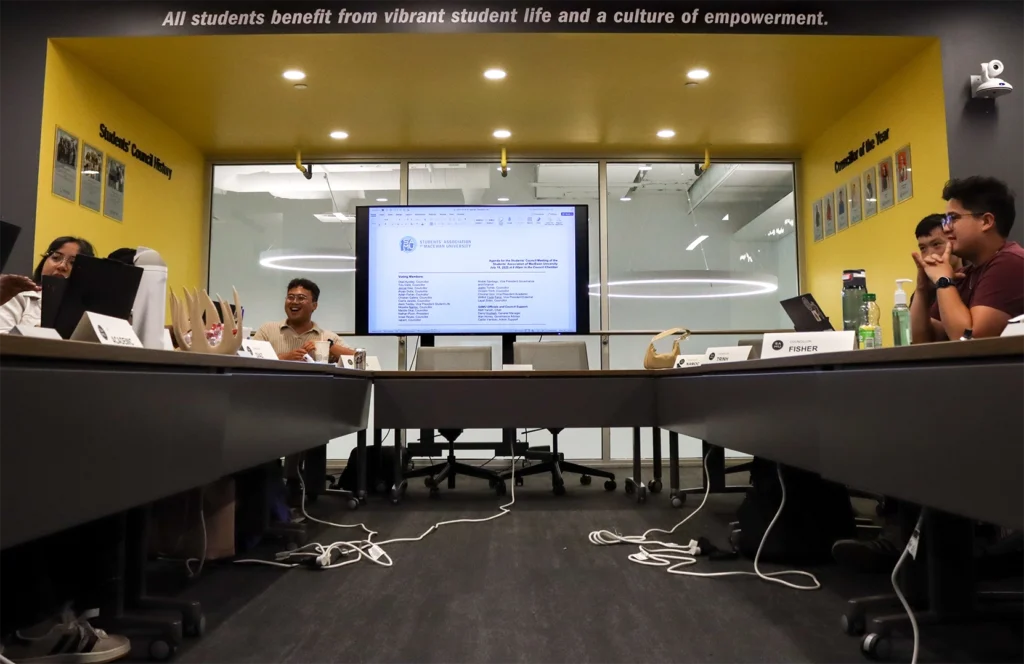Graphic by Forrester Toews/The Griff, Photo by Amanda Erickson/TheGriff
Editor’s note: The author, Darcy Hoogers, served as vice-president (academic) for the 2024-2025 SAMU executive committee. Hoogers also ran for president this year, but was defeated by Poon.
Executive committee members tend to rise from student group leadership positions. Is SAMU’s governance structure prepared?
SAMU president Nathan Poon holds power surrounding financial and organizational support for all student groups, including the MacEwan United Nations Club (MUNC) — a student group he holds intimate ties.
By policy, Poon is not breaking any SAMU rules. Members of the SAMU executive committee are generally permitted to be non-executive members in SAMU groups without raising a conflict of interest, per SAMU policy. But is that enough to ensure SAMU executives act to support all students on campus?
Conflict of interest & executive power
A conflict of interest can be difficult to define for elected representatives, particularly those with historic ties to numerous organizations. Since its last revision in 2022, SAMU’s Elected Representatives Code of Conduct says that an elected representative is in conflict when they can influence a decision at SAMU or MacEwan University that can result in a “real, potential, or perceived” benefit for that individual. This includes when that individual is an executive of a student group.
SAMU’s definition of a conflict of interest is clear: MacEwan students should not worry about their SAMU executives representing the interests of whatever student group they helped lead. After all, SAMU executives have the power and authority to create, amend, or remove procedures. This includes the Grants Procedure, which provides students and student groups funding “to enhance their educational experience, or that of the student body,” per the procedure’s rationale.
The Grants Procedure directly impacts fundraising for student groups. Because SAMU executives can change procedures, there is a window for a conflict of interest to arise if executives hold executive positions within student groups.
SAMU’s Elected Representative Code of Conduct states that elected representatives do not have a conflict of interest when they are a regular, non-executive member of a student group.
“An Elected Representative generally does not have a Conflict of Interest … [w]hen involved in a decision for a student group in which they are also a non-executive Member.”
— Elected Representatives Code of Conduct Policy, Students’ Association of MacEwan University
Intimate ties
There is precedent for SAMU executives to be involved in student group leadership. Both the SAMU president and vice-president (governance and finance) from 2023-2025, Gabriel Ambutong and Joseph La Torre, were also founding members of the MacEwan Chess Club.
Most of the current SAMU executives held leadership roles within student groups.
Alem Tesfay, vice-president (student life) was a co-founder of the MacEwan Chess Club. Chioma Uzor, vice-president (academic) was co-president of the Black Students’ Alliance of MacEwan University for two terms, earning SAMU’s Student Group Member of the Year award in 2024. SAMU’s vice-president (governance and finance), Andrei Santiago, served as a finance executive for both the Filipino Barkada Club and the MacEwan University Commerce Club.
However, the clubs that Tesfay, Uzor, and Santiago led do not hold the same institutional connection to MacEwan University as the MUNC.
Unlike most student groups, the MUNC draws from its membership to represent MacEwan University at model United Nations conferences, among other events.
Functionally, the MUNC serves to gather and prepare delegates. But the affiliation with MacEwan University is what creates a grey zone between SAMU and MacEwan. While the MUNC is under SAMU’s purview, the MacEwan Model UN Club, a MacEwan University organization, is not. The line between the MUNC and the MacEwan Model UN Club is blurred as the two organizations are referred to synonymously within MacEwan University’s external communications.

Poon has been very active within the MUNC. He served as their president and secretary general from 2023 to 2025. On his LinkedIn profile, Poon writes that he oversaw the MUNC executive team, conferences, and “all activities.”
Poon’s leadership in building the MUNC’s reputation is noteworthy. Over the past few years, Poon has visited New York for the National Model United Nations (NMUN). The group has won multiple awards at the conferences he’s participated in, and he was reported to be on the planning committee for the upcoming NMUN taking place in Banff in November on MacEwan’s website.
In an email received on Jul. 30, Poon said that he is “no longer affiliated with the MUNC in an Executive capacity.” However, he declined the opportunity to speak about the MUNC, leaving a grey area surrounding his current relationship with the club.
MUNC’s website had him listed as secretary-general as recently as Jul. 24, but their website has since been updated to reflect that the role now belongs to Christian Galera, who is a current SAMU students’ councillor.
Overlapping timelines
Poon began contributing to the NMUN Canada 2025 conference in May 2024 and he lists himself as a planning committee member on LinkedIn. On May 1, Poon took office as SAMU president. Most recently, Poon was part of a MUNC delegation representing MacEwan University in Japan from Jun. 27 to 29.
How, then, can the president of SAMU avoid competing interests when they have, and are currently, serving the interests of an entity that skirts across a grey zone of both MacEwan and SAMU affiliation?
Despite the timing of the MacEwan United Nations Club’s Japan conference, the MUNC filed an updated constitution before the conference in Japan, signed and dated Jun. 25, 2025, proving that Poon is not a student group executive. By SAMU’s Elected Representatives Code of Conduct, a conflict of interest is technically avoided—but that definition avoids considering cases where SAMU executives hold, and still hold, intimate relationships with organizations that serve an interest other than serving the entire student body.
Student dollars at work
This issue concerns all MacEwan students. SAMU executives are well-compensated. In addition to tuition being paid by SAMU, members of the executive team garner a yearly salary of $50,546.67. With 35-hour work weeks, this equates to roughly $27.77/hr, plus vacation, sick time, phone reimbursement, and health benefits—all covered by student SAMU fees.
MacEwan students, therefore, directly pay for the work, advocacy and outcomes which come from SAMU executives. Should it be the case that, upon taking office, members of the SAMU executive committee cease membership with their respective student groups, to solely focus on advocating for the entire student body? With no increases for MacEwan’s operating grant from the Alberta Government, student advocacy is more important than ever.
As SAMU’s mission statement focuses on “being a champion for all students,” SAMU executives owe students their undivided attention and passion.
The Griff made requests to both Nathan Poon and the MacEwan United Nations Club for comment. Poon declined an interview opportunity. The MacEwan United Nations Club did not respond to any requests for comment.
Note: August 29th 2025, The sentence written as “is lists himself” under Overlapping Timelines has now been changed to “he lists himself.”





0 Comments